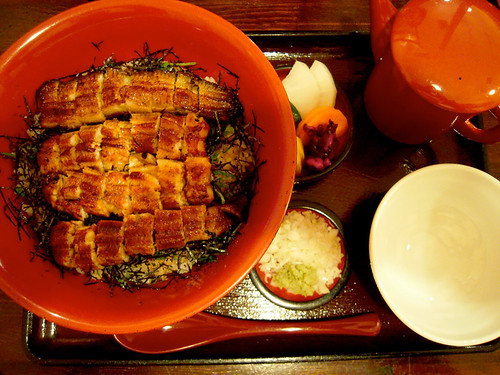
While my husband is away in Tokyo this week, I dig myself deeper everyday into a dark hole of despair and yearning. With emails from him like "I am going to
Bar Tender in the day then
Sasagin and
Saburo in the night," missing him is eclipsed by missing the food in Tokyo.
To torture myself even more, I dug through a bunch of Tokyo food images from my dusty external hard drive.
I couldn't believe that I had neglected to write a post about one of my favorite unagi restaurants in Tokyo while I was living there. But I did pat myself on the back for documenting the spot well.
Unagi Ochai was one of my usual spots in Hatagaya, Tokyo. Located near the north exit of Hatagaya Station, it's only visible to passersby above-ground by a little lit-up sign that says "Unagi Ochiai" (うなぎ落合 in Japanese). The restaurant itself is underground and seats about 15 people.
An unagi restaurant in Japan is not joking when it proclaims itself so. Most dishes are made with unagi and diners should expect to eat more than a few dishes that incorporate eel.
Not to be missed at Ochiai is the unagi-sushi plate. Eight perfectly positioned cuties land on the table with appropriate garnishes including pickles, soy sauce and a light soup.
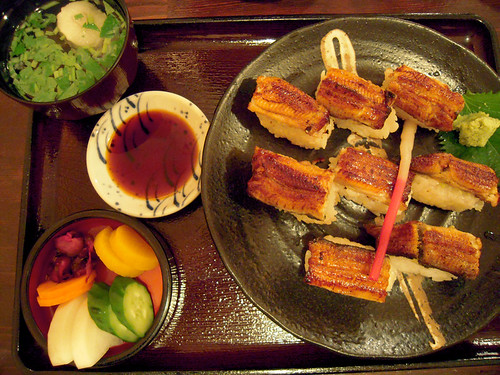
Stomach: grrrr.
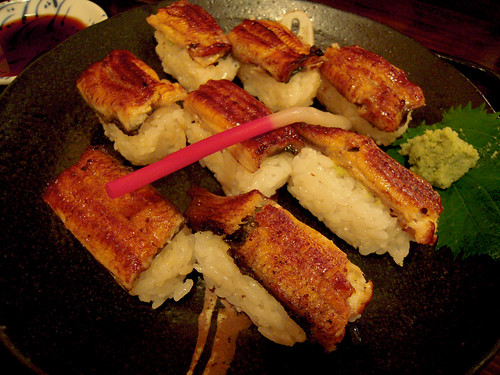
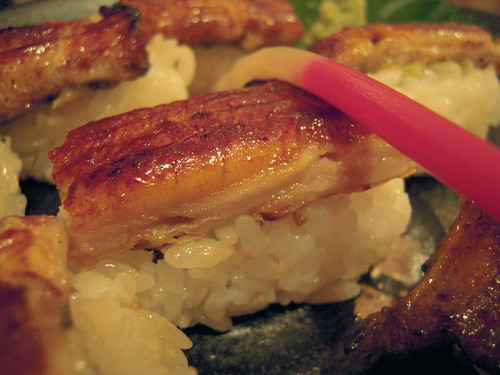
Marrying a Nagoya native opened my eyes to "hitsumabushi" which is roughly translated as "mixed stuff in a bowl/container." I must say that they should probably rename it to "AWESOME mixed stuff in a bowl/container." The Japanese are so modest.
Hitsumabushi contains a bunch of rice with a generously dense offering of barbecued eel on top, sprinkled with nori and shiso leaves.
Is that you, I hear asking... "That sounds like an unadon... you're not telling me anything I don't already know about"?
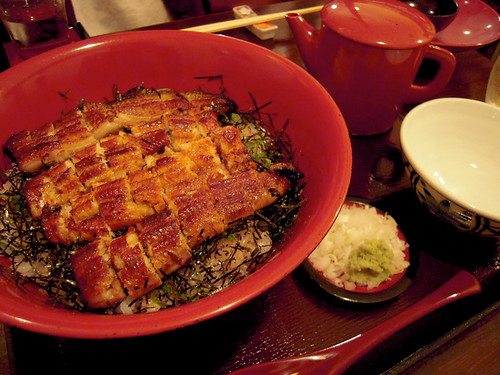
Hitsumabushi is different from unadon for several reasons:
1) The grilling technique for hitsumabushi is Nagoya style, with a little bit more crunch to it.
2) Unadon consists of two, uncut unagi pieces laying across rice. The eel for a hitsumabushi bowl covers the rice in many rows and is cut into 1cm pieces.
3) Unadon usually comes in a rectangular container while hitsumabushi comes in a bowl.
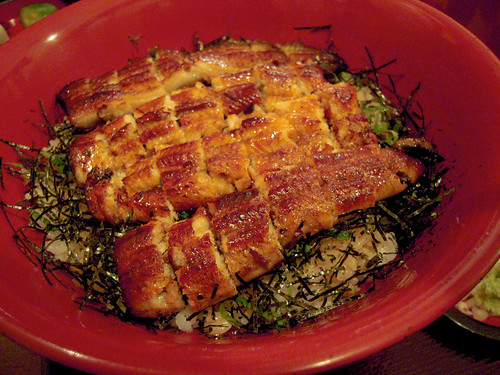
But this last difference is what really got me
4) Hitsumabushi is always served with a dashi broth. The broth is used in the end to enjoy the eel and rice ochazuke-style (liquid over rice).
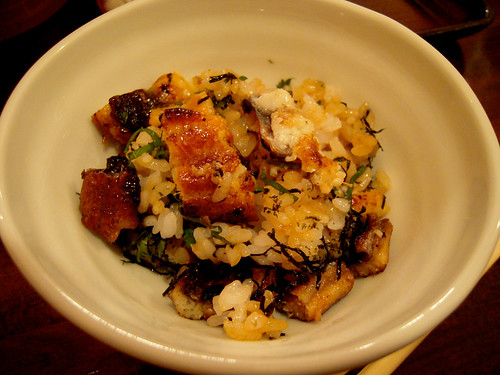
My first encounter with hitsumabushi introduced me with a dilemma: at what point do I switch from eating the "dry" rice/eel combination with the "ochazuke" version. Everyone has their own rules, but I would usually find myself pouring the dashi over my bowl about 1/2 to 2/3 of the way through the consumption of my rice and eel.
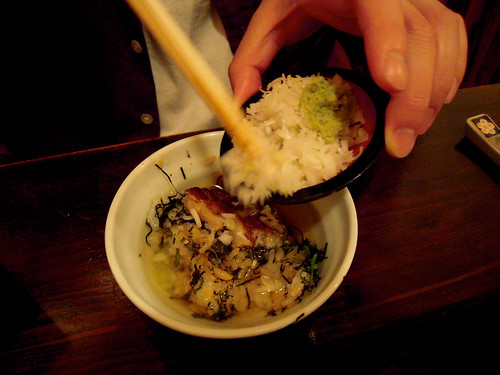
Sigh.
I miss my husband. But I miss my hitsumabushi more.
 While my husband is away in Tokyo this week, I dig myself deeper everyday into a dark hole of despair and yearning. With emails from him like "I am going to Bar Tender in the day then Sasagin and Saburo in the night," missing him is eclipsed by missing the food in Tokyo.
To torture myself even more, I dug through a bunch of Tokyo food images from my dusty external hard drive.
I couldn't believe that I had neglected to write a post about one of my favorite unagi restaurants in Tokyo while I was living there. But I did pat myself on the back for documenting the spot well.
Unagi Ochai was one of my usual spots in Hatagaya, Tokyo. Located near the north exit of Hatagaya Station, it's only visible to passersby above-ground by a little lit-up sign that says "Unagi Ochiai" (うなぎ落合 in Japanese). The restaurant itself is underground and seats about 15 people.
An unagi restaurant in Japan is not joking when it proclaims itself so. Most dishes are made with unagi and diners should expect to eat more than a few dishes that incorporate eel.
Not to be missed at Ochiai is the unagi-sushi plate. Eight perfectly positioned cuties land on the table with appropriate garnishes including pickles, soy sauce and a light soup.
While my husband is away in Tokyo this week, I dig myself deeper everyday into a dark hole of despair and yearning. With emails from him like "I am going to Bar Tender in the day then Sasagin and Saburo in the night," missing him is eclipsed by missing the food in Tokyo.
To torture myself even more, I dug through a bunch of Tokyo food images from my dusty external hard drive.
I couldn't believe that I had neglected to write a post about one of my favorite unagi restaurants in Tokyo while I was living there. But I did pat myself on the back for documenting the spot well.
Unagi Ochai was one of my usual spots in Hatagaya, Tokyo. Located near the north exit of Hatagaya Station, it's only visible to passersby above-ground by a little lit-up sign that says "Unagi Ochiai" (うなぎ落合 in Japanese). The restaurant itself is underground and seats about 15 people.
An unagi restaurant in Japan is not joking when it proclaims itself so. Most dishes are made with unagi and diners should expect to eat more than a few dishes that incorporate eel.
Not to be missed at Ochiai is the unagi-sushi plate. Eight perfectly positioned cuties land on the table with appropriate garnishes including pickles, soy sauce and a light soup.
 Stomach: grrrr.
Stomach: grrrr.

 Marrying a Nagoya native opened my eyes to "hitsumabushi" which is roughly translated as "mixed stuff in a bowl/container." I must say that they should probably rename it to "AWESOME mixed stuff in a bowl/container." The Japanese are so modest.
Hitsumabushi contains a bunch of rice with a generously dense offering of barbecued eel on top, sprinkled with nori and shiso leaves.
Is that you, I hear asking... "That sounds like an unadon... you're not telling me anything I don't already know about"?
Marrying a Nagoya native opened my eyes to "hitsumabushi" which is roughly translated as "mixed stuff in a bowl/container." I must say that they should probably rename it to "AWESOME mixed stuff in a bowl/container." The Japanese are so modest.
Hitsumabushi contains a bunch of rice with a generously dense offering of barbecued eel on top, sprinkled with nori and shiso leaves.
Is that you, I hear asking... "That sounds like an unadon... you're not telling me anything I don't already know about"?
 Hitsumabushi is different from unadon for several reasons:
1) The grilling technique for hitsumabushi is Nagoya style, with a little bit more crunch to it.
2) Unadon consists of two, uncut unagi pieces laying across rice. The eel for a hitsumabushi bowl covers the rice in many rows and is cut into 1cm pieces.
3) Unadon usually comes in a rectangular container while hitsumabushi comes in a bowl.
Hitsumabushi is different from unadon for several reasons:
1) The grilling technique for hitsumabushi is Nagoya style, with a little bit more crunch to it.
2) Unadon consists of two, uncut unagi pieces laying across rice. The eel for a hitsumabushi bowl covers the rice in many rows and is cut into 1cm pieces.
3) Unadon usually comes in a rectangular container while hitsumabushi comes in a bowl.
 But this last difference is what really got me
4) Hitsumabushi is always served with a dashi broth. The broth is used in the end to enjoy the eel and rice ochazuke-style (liquid over rice).
But this last difference is what really got me
4) Hitsumabushi is always served with a dashi broth. The broth is used in the end to enjoy the eel and rice ochazuke-style (liquid over rice).
 My first encounter with hitsumabushi introduced me with a dilemma: at what point do I switch from eating the "dry" rice/eel combination with the "ochazuke" version. Everyone has their own rules, but I would usually find myself pouring the dashi over my bowl about 1/2 to 2/3 of the way through the consumption of my rice and eel.
My first encounter with hitsumabushi introduced me with a dilemma: at what point do I switch from eating the "dry" rice/eel combination with the "ochazuke" version. Everyone has their own rules, but I would usually find myself pouring the dashi over my bowl about 1/2 to 2/3 of the way through the consumption of my rice and eel.
 Sigh.
I miss my husband. But I miss my hitsumabushi more.
Sigh.
I miss my husband. But I miss my hitsumabushi more.



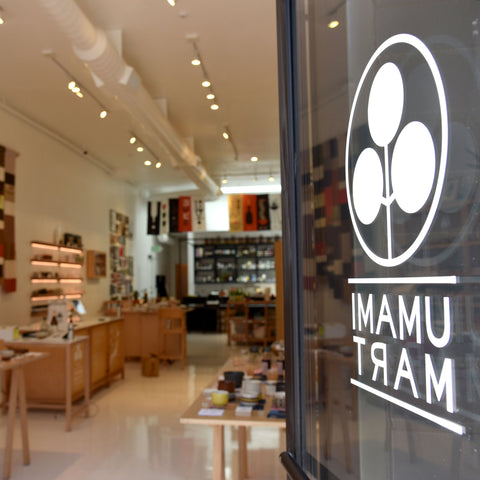
Comments (2)
I’m a Nagoya gal but have never had hitsumabushi! How is that possible? I’m going to go and interrogate my mum when I’m next home as my whole family are unadon fans.
Sakura! Yes, when I would go to Nagoya all I would do was eat unagi, miso and katsu. It’s all very brown and thick in Nagoya.